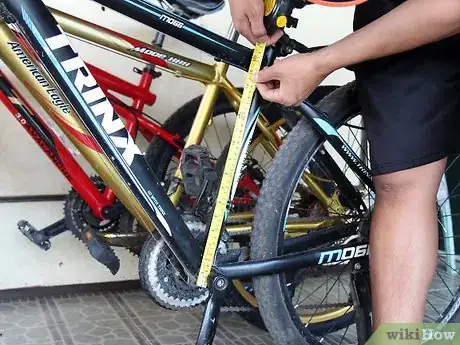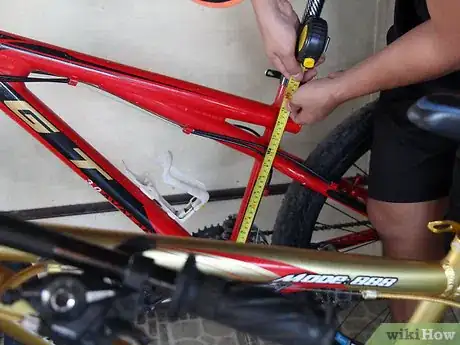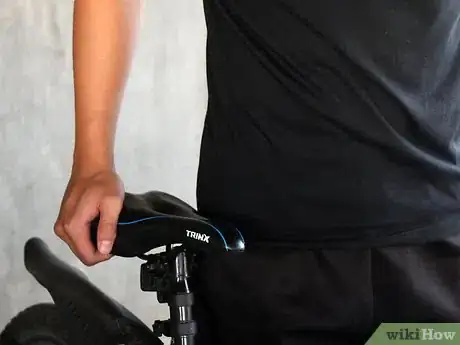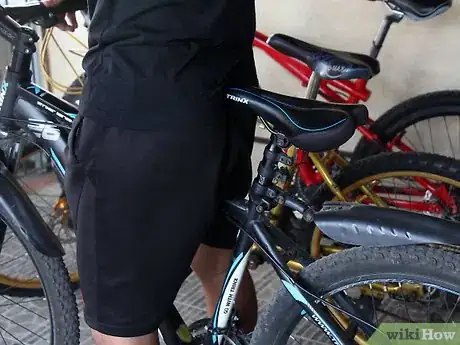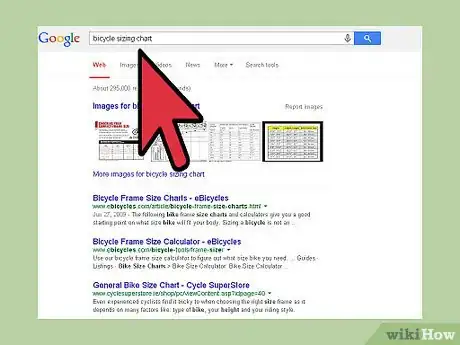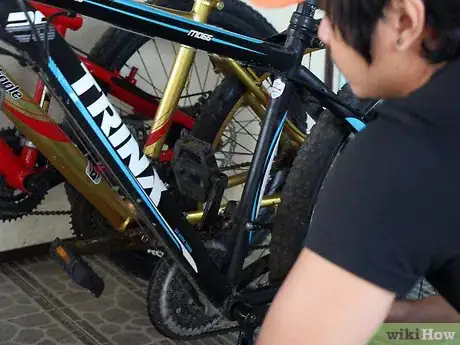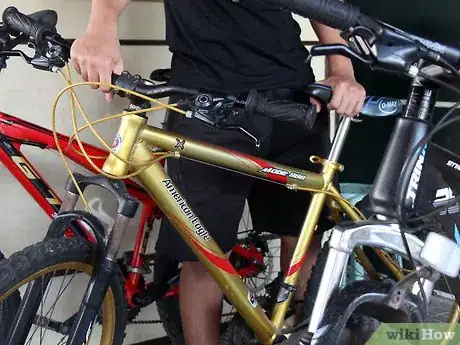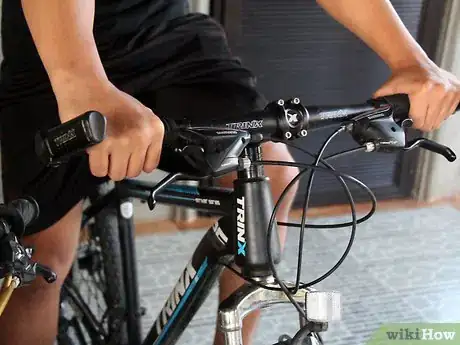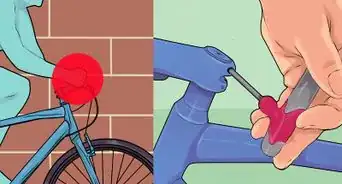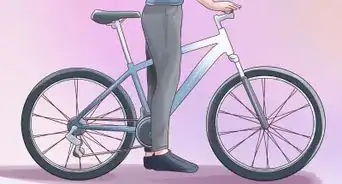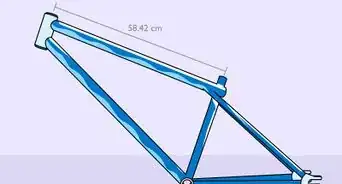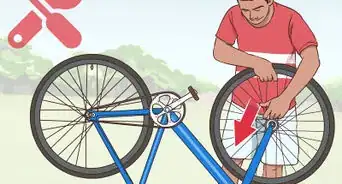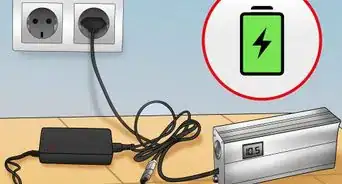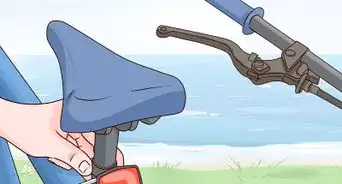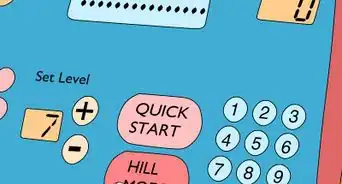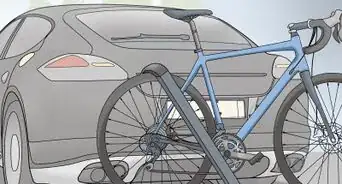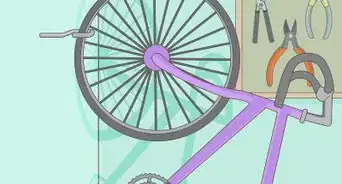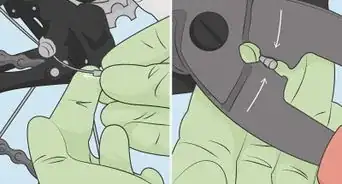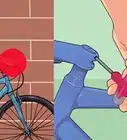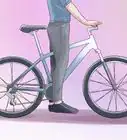wikiHow is a “wiki,” similar to Wikipedia, which means that many of our articles are co-written by multiple authors. To create this article, volunteer authors worked to edit and improve it over time.
This article has been viewed 44,871 times.
Learn more...
Finding the proper size is one of the most important decisions you make when selecting your new bicycle. Size effects safety, comfort and fun. Proper sizing lends confidence to maneuvering well in tight situations, and allows longer riding without pain. The sizing experience can range from a lap around the parking lot to an hours long, computer supported analysis of multiple human and mechanical dimensions. These steps will help you confidently pick the right size bike with minimal effort.
Steps
Measuring the bicycle
-
1Measure the bike. The two most important measurements on any bike for comfort is the size of the frame and the distance between the seat and the pedal when it is at the bottom of its rotation.
-
2Measure your inside leg length, otherwise known as your inseam, from your crotch to the ground. Stand with your feet flat.
- If it measures between 68 – 76 centimeter (29.9 in), choose a 16” – 17” frame size.
- If your inner leg measurement is between 76 - 84 cm, choose a 18” – 20” frame size for men’s bikes, and a 16” – 17” frame size for women’s bikes.
- If your inner leg measurement is longer, choose a 20”+ frame for men's mountain bikes, or a 21”+ frame for men's town, trail and road bikes.
- For women with a leg measurement of more than 84 centimeter (33.1 in), choose a 16”+ frame for mountain bikes, or a 18”+ frame for town, trail and road bikes.
Advertisement -
3Measure against yourself:
- Stand beside the bike. If the seat is just below your hipbone, you have a good starting point.
- Stand over the bike with your feet on either side and with the seat touching your back. In this position you should have 1.5–2.0” of space between your crotch and the top bar for a road bike, 2.0-4.0” for a mountain bike. Measure this dimension by holding the bike so that that bar comfortably contacts your crotch and someone measures the distance between the bottom of the tire and the ground. Alternatively, two to three fingers between your crotch and the top tube are a good estimate for a road bike. On a mountain bike, four fingers or your entire hand will provide enough room. Finally, with someone holding the handlebars securely, sit on the comfortably bike with one pedal at the bottom of its rotation. If your knee is slightly bent, the bike is adjusted properly. Too little or too much bend will stress parts of your leg and lead to discomfort.
-
4Look online for a “bicycle sizing chart”. It will provide multiple techniques to estimate your proper frame size. These recommendations are often ranges of frame size that must be finalized by your personal experience and preference.
Measuring in other ways
-
1Check the frame. Frame size is typically measured from the middle of the front sprocket to the top of the tube that holds the seat (C/T). It may also be measured from the middle of the sprocket to the center of the top tube (C/C). This dimension is often printed on a label at the top or bottom of the seat tube, sometimes with a picture. A bike shop person will know which method the manufacturer of each bike uses. The frame may be dimensioned in centimeters, inches or designated small, medium, large. To calculate a good estimate of the frame size for you, measure the distance from your crotch to the floor and multiply by .66.
- For any frame that does not have a straight top tube, omit that measurement and go with the other two. Children’s bikes are sized differently, based on the child’s height, and expressed as wheel size. An Internet search on this topic will give you proper guidance.
-
2Take a ride. The most important measuring technique is the test ride. Everyone is a little different, and personal preference has a huge impact on our perception of bike fit. Make your test ride long enough to get a real feel for the bike over smooth and rough terrain. Vary your speed from very slow to comfortably fast. Make some quick changes in speed and direction. The right bike for you will feel comfortable during all these maneuvers and provide pleasurable riding.
- If you feel it is hard to get off and on of then maybe it isn't for you. Finding a comfortable bike is key if you're going to be using it a lot (or using it at all).
-
3Check that you can adjust the seat. It should be adjusted in such a way that your leg is straight or nearly straight when pedaling.
- You should be able to reach the ground on both sides at once, by pointing your toes.
- Your knees and feet should not hit the handlebars or front wheel.
- You should not rest heavily against the top tube when you straddle the bike.
- It may depend on the type of handlebars you have, but you may be best off if, when you are in a riding position, you cannot see the front axle through the handlebars or handlebar bracket. That is, there should be a straight line between the front axle, the handlebars, and your eyes.
-
4Check that your saddle is clear of the top tube. On road bikes you should be 1" clear. On mountain bikes you should be 3" clear. Is the bike too high for you? This is measurable (roughly) if you stand directly next to it. If the saddle reaches your hip it should be alright.
Warnings
- Wear a helmet⧼thumbs_response⧽
- Make safety part of your initial review of any bike. Look, twist and shake to be sure that everything is attached securely and will function properly during your ride.⧼thumbs_response⧽
- Take your test ride cautiously. Unfamiliar equipment and territory can make accidents more likely.⧼thumbs_response⧽
